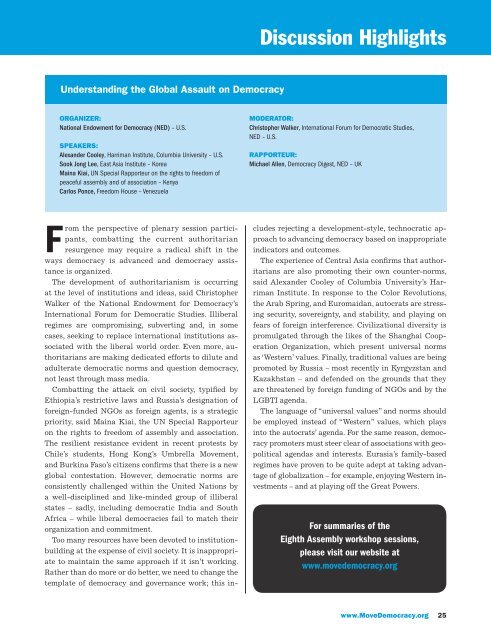You also want an ePaper? Increase the reach of your titles
YUMPU automatically turns print PDFs into web optimized ePapers that Google loves.
Discussion Highlights<br />
Understanding the Global Assault on Democracy<br />
ORGANIZER:<br />
National Endowment for Democracy (NED) – U.S.<br />
SPEAKERS:<br />
Alexander Cooley, Harriman Institute, Columbia University – U.S.<br />
Sook Jong Lee, East Asia Institute – Korea<br />
Maina Kiai, UN Special Rapporteur on the rights to freedom of<br />
peaceful assembly and of association – Kenya<br />
Carlos Ponce, Freedom House – Venezuela<br />
MODERATOR:<br />
Christopher Walker, International Forum for Democratic Studies,<br />
NED – U.S.<br />
RAPPORTEUR:<br />
Michael Allen, Democracy Digest, NED – UK<br />
From the perspective of plenary session participants,<br />
combatting the current authoritarian<br />
resurgence may require a radical shift in the<br />
ways democracy is advanced and democracy assistance<br />
is organized.<br />
<strong>The</strong> development of authoritarianism is occurring<br />
at the level of institutions and ideas, said Christopher<br />
Walker of the National Endowment for Democracy’s<br />
International Forum for Democratic Studies. Illiberal<br />
regimes are compromising, subverting and, in some<br />
cases, seeking to replace international institutions associated<br />
with the liberal world order. Even more, authoritarians<br />
are making dedicated efforts to dilute and<br />
adulterate democratic norms and question democracy,<br />
not least through mass media.<br />
Combatting the attack on civil society, typified by<br />
Ethiopia’s restrictive laws and Russia’s designation of<br />
foreign-funded NGOs as foreign agents, is a strategic<br />
priority, said Maina Kiai, the UN Special Rapporteur<br />
on the rights to freedom of assembly and association.<br />
<strong>The</strong> resilient resistance evident in recent protests by<br />
Chile’s students, Hong Kong’s Umbrella Movement,<br />
and Burkina Faso’s citizens confirms that there is a new<br />
global contestation. However, democratic norms are<br />
consistently challenged within the United Nations by<br />
a well-disciplined and like-minded group of illiberal<br />
states – sadly, including democratic India and South<br />
Africa – while liberal democracies fail to match their<br />
organization and commitment.<br />
Too many resources have been devoted to institutionbuilding<br />
at the expense of civil society. It is inappropriate<br />
to maintain the same approach if it isn’t working.<br />
Rather than do more or do better, we need to change the<br />
template of democracy and governance work; this includes<br />
rejecting a development-style, technocratic approach<br />
to advancing democracy based on inappropriate<br />
indicators and outcomes.<br />
<strong>The</strong> experience of Central Asia confirms that authoritarians<br />
are also promoting their own counter-norms,<br />
said Alexander Cooley of Columbia University’s Harriman<br />
Institute. In response to the Color Revolutions,<br />
the Arab Spring, and Euromaidan, autocrats are stressing<br />
security, sovereignty, and stability, and playing on<br />
fears of foreign interference. Civilizational diversity is<br />
promulgated through the likes of the Shanghai Cooperation<br />
Organization, which present universal norms<br />
as ‘Western’ values. Finally, traditional values are being<br />
promoted by Russia – most recently in Kyrgyzstan and<br />
Kazakhstan – and defended on the grounds that they<br />
are threatened by foreign funding of NGOs and by the<br />
LGBTI agenda.<br />
<strong>The</strong> language of “universal values” and norms should<br />
be employed instead of “Western” values, which plays<br />
into the autocrats’ agenda. For the same reason, democracy<br />
promoters must steer clear of associations with geopolitical<br />
agendas and interests. Eurasia’s family-based<br />
regimes have proven to be quite adept at taking advantage<br />
of globalization – for example, enjoying Western investments<br />
– and at playing off the Great Powers.<br />
For summaries of the<br />
<strong>Eighth</strong> <strong>Assembly</strong> workshop sessions,<br />
please visit our website at<br />
www.movedemocracy.org<br />
www.MoveDemocracy.org 25


